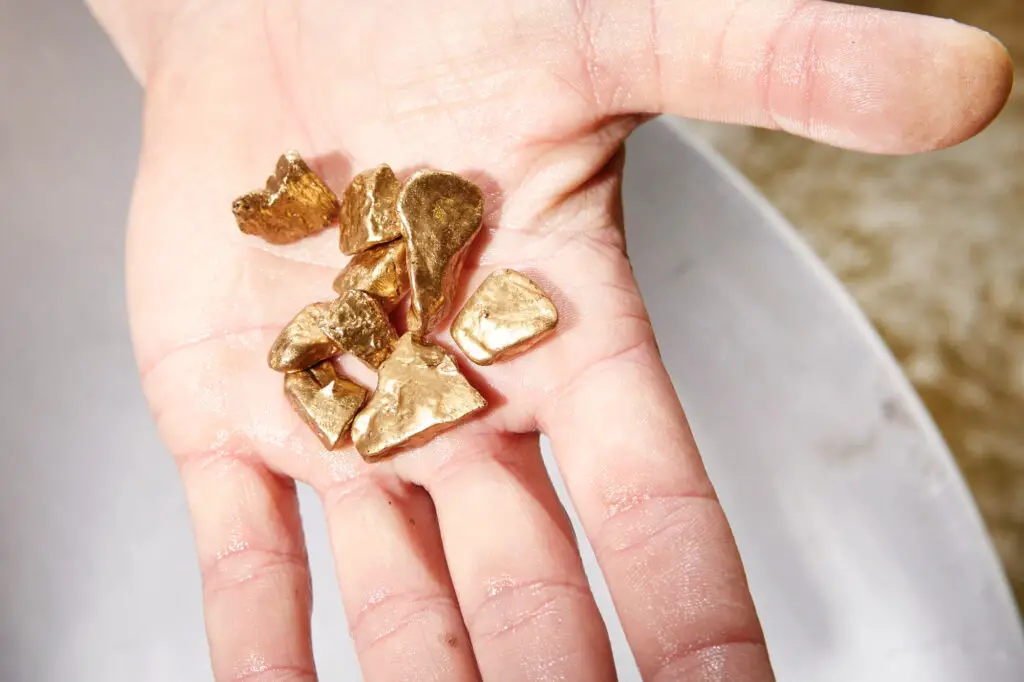Have you ever wanted to embark on an adventure that combines the allure of history, the thrill of exploration, and the joy of discovery? Welcome to the world of gold prospecting in Tennessee! As we delve into this fascinating pursuit, we’re going to guide you through the majestic riverbeds, old mines, and serene landscapes of the Volunteer State where gold has been discovered in the past.
But before we lead you on this exciting journey, it is crucial to understand that prospecting for gold isn’t just about grabbing a pan or detector and setting off into the wilderness. The endeavor is bound by certain regulations and restrictions. It’s essential to respect both the law and the environment while indulging in this exciting pastime.
This blog post aims to introduce you to the world of gold panning and prospecting in Tennessee, highlighting some of the state’s most lucrative spots for finding this precious metal. It also provides an overview of the legalities and regulatory landscape that governs gold prospecting in the area. So, whether you’re an experienced prospector or just starting out, read on for the knowledge you need to enhance your search for gold in Tennessee. Buckle up, gold seekers, it’s time to begin our journey!

Is Tennessee Rich In Gold?
While Tennessee is known for a number of mineral resources, it’s not particularly famous for its gold deposits compared to states like California or Alaska. That said, gold has been found in Tennessee, primarily in the eastern part of the state and in the area along the Coker Creek.
The gold in Tennessee is believed to be a part of the Appalachian Gold Belt, which runs along the Appalachian Mountains from Georgia up to Virginia. The gold found here is often fine and small, referred to as flour or placer gold. You’re unlikely to stumble across large nuggets, but with patience and the right techniques, prospectors can still discover gold.
However, the quantity of gold in Tennessee is relatively modest and mining isn’t as commercially viable as in other states with richer deposits. Nevertheless, for hobbyists, prospectors, and gold panning enthusiasts, the thrill of the hunt and the potential for discovery makes Tennessee a location of interest. Always remember to respect local regulations and private property rights in your quest for gold.
What Are The Rules And Regulations For Panning And Gold Detecting In Tennessee?
Here are some general rules and regulations pertaining to gold panning and gold detecting in Tennessee:
Property Rights: It’s illegal to prospect for gold on private property without the owner’s permission. If you want to prospect on someone’s property, make sure you get written permission.
National Parks and Protected Areas: You cannot pan for gold or use a metal detector in national parks, national monuments, or protected areas in Tennessee. Doing so can result in hefty fines and potential legal action.
Dredging and Commercial Operations: In many states, including Tennessee, dredging and commercial mining operations are generally not allowed without specific permits. Even recreational prospecting activities can sometimes require permits, particularly if they may affect water quality or cause disturbance to the stream bed. Always check local and state regulations.
Coker Creek: The Coker Creek GPAA (Gold Prospecting Association of America) has leased property from the TWRA (Tennessee Wildlife Resources Agency) for gold prospecting. In general, areas that are not leased by the GPAA along Coker Creek are off-limits for prospecting.
Given that regulations can and do change, it’s crucial to check with local and state authorities before embarking on any prospecting activities. Also, it’s recommended to join a local prospecting club, like the GPAA, which often has access to properties that are otherwise off-limits to individual prospectors.
Lastly, remember the basic rule of prospecting: Respect the land you’re on. Fill in any holes you dig, do not damage vegetation, and leave the area as you found it. Responsible prospecting helps ensure that these activities will be allowed to continue in the future.
What Is The Permit Cost For Detecting And Panning In Tennessee?
Specific permit costs for gold prospecting (including panning and metal detecting) in Tennessee could vary depending on the location and type of activity.
Permit requirements often depend on whether you’re prospecting on public or private land, the scale of your operation (recreational vs. commercial), and the specific methods you’re using (panning, sluicing, dredging, etc.). Some activities may not require a permit at all if they’re small scale and non-invasive, like recreational gold panning.
The Tennessee Wildlife Resources Agency (TWRA) is usually the point of contact for specific questions about permits for activities that could impact natural resources in the state. In some cases, other agencies like the U.S. Forest Service, National Park Service, or Bureau of Land Management may be included, especially for lands under their management.
As regulations and fees can change, and can also be complex depending on the specific circumstances, it’s always a good idea to directly contact the relevant state or federal agency for the most accurate, up-to-date information.
Remember, prospecting without necessary permissions or permits can result in fines or other legal consequences. Always make sure you have the proper permissions and fully understand the rules before you begin prospecting for gold.
What Are 10 Great Places To Find Gold In Tennessee?
The following are known areas in Tennessee where gold has been found in the past, making them intriguing spots for modern-day prospectors. Remember, access to these locations may vary, and prospecting may require permission or permits, so always verify the current status and regulations before setting out.
Coker Creek: Located in Monroe County, Coker Creek is perhaps the most famous gold prospecting area in Tennessee. It was the site of a minor gold rush in the 1800s.
Little River: The Little River has been a fruitful spot for gold prospecting, flowing through the Great Smoky Mountains in East Tennessee.
Duck River: Found in Middle Tennessee, Duck River has reports of gold discoveries, mainly in the form of fine flour gold.
Nolichucky River: This river, particularly around the town of Greeneville, has reported gold finds.
French Broad River: Located near the town of Newport, prospectors have found gold in this river.
Pigeon River: Especially around the area of Hartford, prospectors have reported gold finds.
Tellico River: This river, located in Monroe County like Coker Creek, is known for fine placer gold.
Calfkiller River: Located in the Cumberland Plateau, the Calfkiller River has had reports of gold, particularly around Sparta.
Ocoee River: The Ocoee River, especially in Polk County, is known for having fine gold.
Citico Creek: This is another creek in Monroe County where gold has been reported, it feeds into the Tellico River.
Prospecting in Tennessee can be an enjoyable and exciting activity. However, keep in mind that the gold found in the state is often in the form of small flakes or fine flour gold. Patience, the right equipment, and proper technique are essential. Good luck, and happy prospecting!

